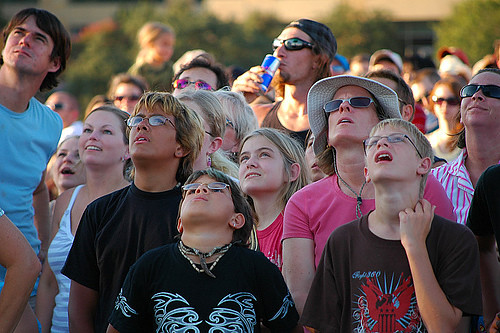 There always seems to be a lot of talk about the need for more teachers to embrace “21st Century skills”. Of course, there’s a lot of discussion about what these “21st Century skills” actually are. Many people have debated and discussed this issue, asking the question of what exactly should today’s learners know in order to function in the “21st Century”.
There always seems to be a lot of talk about the need for more teachers to embrace “21st Century skills”. Of course, there’s a lot of discussion about what these “21st Century skills” actually are. Many people have debated and discussed this issue, asking the question of what exactly should today’s learners know in order to function in the “21st Century”.
I’m sure there are a whole lot of really good answers to these questions that dig deeply into effective pedagogy and the deeper philosophy of education. This post is not about those things.
Instead, here is a list of simple, easily-learnable skills that I think would make life as a teacher in the 21st Century simpler and much more productive. While they’re not exactly earth-shatteringly profound in terms of the big issues of education, they are greatly useful skills to have… and in my experience they are also skills that all too few teachers seem to actually possess. I find that possession of these skills is often a reasonable indicator of a teacher’s progress along the “21st Century teaching” pathway – if they can do these things, they often “get” the bigger picture about technology and its role in modern learning.
Actually, I think I’d go beyond just calling them just “skills”… I’d tend to see these as entirely new types of literacies, because the ability to do these things is beginning to define our ability to function with fluency in these times we live in.
- Learn to search. It’s amazing how many people cannot do even a moderately complex search, using some sort of boolean thinking to narrow search results. What’s even more surprising is the number of people who do not even think to use a web-based search engine to find answers to questions that puzzle them. I find it astounding that so many people wonder about the answers to questions that are just a quick Google search away, but they never think to do it. Learn to use a search engine to find a simple answer, a fact, a quote, a statistic, a song lyric, a recipe, a price, or any other useful snippet of information. The time taken to learn this simple skill will pay for itself many times over.
- Learn to resize and crop a digital photo. Being able to crop and resize a digital photo is an incredibly useful skill that has applications in so many areas. There’s not a lot to it, and it doesn’t require any particularly exotic or expensive software. It’s useful to understand issues like how to make an image suitable for use in print versus the web. We live in a very visual world and once you know how do simple image manipulation you will find uses for this skill everywhere.
- Learn how to edit video. I once heard Hall Davidson say, given the right 2 minutes of video footage, you can teach anybody anything. Video really is shaping up to be the next important literacy, and for a teacher, the ability to manipulate short chunks of moving images is extremely valuable. Video editing is quick and easy to learn these days, and has many, many applications. Spend a little time with free tools like iMovie or Movie Maker and work out how to edit and remix video footage. You won’t regret it.
- Learn to use a HTML Editor. If you want to participate in the 21st Century you need to know how to create content for the web. And while there’s no real need to know how to write raw HTML code, it’s hugely valuable to be able to competently use a web-based HTML editor. Every web-based environment has one, whether it’s WordPress, Moodle, Wikispaces or something else, and every time you add content to a site you need to interact with the rows of buttons above the text input field called the HTML Editor. Beyond just making things bold and italic, it’s really worth understanding the function of other tools for adding tables, embedding web media, adding images and so on. If you believe that the web has an important role to play in our future, then learn how to create simple content for it with a HTML Editor.
- Learn to think in hyperlinks. I was going to include this in the previous item, since a HTML Editor is where you’d normally create hyperlinks, but I think this skill is important enough to have its own category. Hyperlinks ARE the web. In a world that is becoming more and more reliant on the web for every aspect of our lives, you really do need to know how to create these links that help us tie ideas together. For teachers, connecting students to ideas is what we do, and the ability to create a hyperlink should be a fundamental skill. Hyperlinking totally changes the way a reader interacts with text and is therefore an important new literacy, yet so many teachers have still not come to terms with the importance of explicitly teaching their students to read using hypertext. Hyperlinking is easy to do, but it requires a different mindset to constantly think in terms of hypertext. Learn to link!
So there you have it. Five simple, easy-to-learn skills (or literacies) that will help you function better in “the 21st Century”. How many do you possess? And are there any others that you think should be on the list?
CC Photo: http://www.flickr.com/photos/wwworks/3196112134/

 I wrote a blog post a little while back called
I wrote a blog post a little while back called 
 Earlier this year, I had a visitor from South Africa contact me to ask if they could drop into the school at which I work while they were visiting Australia. She was were here as part of a study tour, and had heard some good things about PLC Sydney. In fact, her school in Johannesburg was a similar sort of school – independent, all girls, similar size – and she was interested in comparing a few ideas. Her school was also using IWBs extensively, and was keen to see how our staff were using them.
Earlier this year, I had a visitor from South Africa contact me to ask if they could drop into the school at which I work while they were visiting Australia. She was were here as part of a study tour, and had heard some good things about PLC Sydney. In fact, her school in Johannesburg was a similar sort of school – independent, all girls, similar size – and she was interested in comparing a few ideas. Her school was also using IWBs extensively, and was keen to see how our staff were using them.